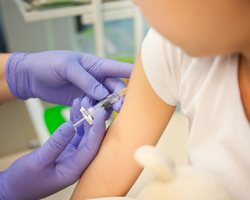Philadelphia Injury Lawyers Discuss Cancer Centers Hope to Increase HPV Vaccination Rate
January 27, 2017 The National Cancer Institute (NCI) has initiated a nationwide effort to increase the rate of HPV vaccination. Although there is an effective vaccine to prevent HPV transmission, too few Americans are aware of or have received the vaccination. As a way to combat this serious public health threat, the NCI is now calling attention to the HPV vaccination in hopes of paving the way for more Americans to become protected.
The National Cancer Institute (NCI) has initiated a nationwide effort to increase the rate of HPV vaccination. Although there is an effective vaccine to prevent HPV transmission, too few Americans are aware of or have received the vaccination. As a way to combat this serious public health threat, the NCI is now calling attention to the HPV vaccination in hopes of paving the way for more Americans to become protected.
HPV, or the human papilloma virus is a sexually transmitted infection. Nearly 80 million Americans are currently infected with HPV, and without vaccination, this number will only continue to grow. Because of the low vaccination rate, almost 15 million people become newly infected each year. The vaccine does not only prohibit a person from contracting HPV, but also aids in the protection from associated cancers, including throat, tonsil, tongue and cervical cancer. At times, HPV induces rare genital cancers as well as other types of head cancer.
27,000 people annually are diagnosed with HPV-related cancers in the United States. At times, the HPV virus clears itself from someone’s system. But at others, it takes hold and can lead to these serious health complications. There have been 18 regional assessments conducted by NCI-designated cancer centers as well as the Centers for Disease Control and Prevention (CDC). These assessments led to the NCI’s launch of its vaccination message, detailing how important it is for men, women and children to receive the vaccine through their health care providers.
The HPV vaccine was first launched in 2006. But the NCI and CDC’s assessments show that there have been certain obstacles to a widespread vaccine. The vaccine consists of three separate shots; meaning three different visits to the doctor. However, at this time the NCI endorses the idea that for younger adolescents, ranging from age 11 to 12, only two vaccinations are needed for effective prevention. When the vaccination first came about, many health care professionals may have been wary of it because it had not been on the market long. Another obstacle can be the link between HPV and sex, with sexuality often a topic of controversy.
But the main point here is that protection is possible, and there are ways to prevent these HPV-related cancers. This means that people’s lives can be saved, and all with a fairly simple, straightforward vaccine regimen. There are other childhood vaccinations that are much more widespread, such as the measles vaccine. As of 2015, prior to the two-shot endorsement, only 13% of teenage boys and 37% of teenage girls had received all three HPV shots.
As we know, the goal of the NCI and CDC is to increase vaccination rates. The combined centers recommend that children ages 11 to 12 receive their first vaccination with the second following six months afterwards. With the NCI and CDC officially endorsing the new federal guideline which says that young adolescents only need two, instead of three, shots to be protected from HPV, this means that only two appointments are necessary for those under the age of 15. But, for those ages 15 to 26, the NCI stands by the original recommendation of three vaccinations for comprehensive HPV protection.
The HPV vaccine has been found to be safe to administer and has gone through multiple, rigorous health and safety trials. The Food and Drug Administration (FDA), as well as the World Health Organization’s Global Advisory Committee on Vaccine Safety approved the vaccine. The CDC recommends vaccines for men up to the age of 21 and women to the age of 26 if they weren’t vaccinated in their youth. The CDC also recommends that women with compromised immune systems receive the vaccination, as well as bisexual and gay men. Ideally, however, all male and female children between the ages of 11 and 12 receive at least two doses of the HPV vaccine, protecting them from HPV-related cancers for the remainder of their lives.
Health care providers should talk with their patients about HPV and encourage them to complete the HPV vaccine series, acting as cancer prevention advocates. With increased administration and education, the rate of immunization will rise. Cancer claims the lives of too many men, women and children every year in the United States, but this vaccine enables us to protect ourselves from those caused by HPV. If you have any questions about the HPV vaccine, please consult directly with your health care provider.
Philadelphia Injury Lawyers at Galfand Berger, LLP Help Raise Awareness of the Importance of Vaccinations
The Philadelphia Injury Lawyers at Galfand Berger have successfully represented clients in many different practice areas. If you or any of your loved has any legal questions, an attorney at Galfand Berger, LLP can help. With offices located in Philadelphia, Reading and Bethlehem, we serve clients throughout Pennsylvania and New Jersey. To schedule a consultation, call us at 800-222-8792 or complete our online contact form.
 Google Screened
Google Screened
